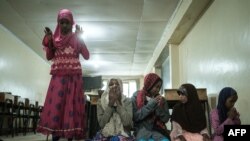The U.N. children’s fund (UNICEF) says COVID-19 is having devastating consequences on millions of children in sub-Saharan Africa, as many become orphaned, making them vulnerable to many social ills.
The region is in the throes of a full-blown third wave of COVID-19. Children are often not directly affected by the deadly disease, but they are losing their parents to the pandemic.
Traditionally, when children become orphaned, the burden of looking after them falls on the grandparents. However, UNICEF spokesman James Elder, said older people are among the main victims of COVID-19. As a result, children are often shoveled off to another relative, who likely is living in dire, impoverished circumstances. The added strain and stress puts children at risk of abuse and child labor.
“We have seen the reporting of children reporting on help lines violence against them and the need for support,” said Elder. “Those things come again when children have lost the support mechanism that they previously had, which often comes from being orphaned or an economic situation where a parent simply had to leave to go elsewhere because economic opportunities have dried up due to the pandemic.”
Children who do not go to school are unprotected and open to exploitation, and Elder said COVID-19 has dealt a devastating blow to education. For example, he noted an estimated 9 million children in eastern and southern Africa haven’t returned to schools since they started re-opening
He also said many children are not getting enough to eat because of growing poverty due to pandemic-related lockdowns, and poor nutrition leads to worsening health.
“We know that routine immunization rates and things like malaria access have been slashed, as I say some by 20 percent,” Elder said. “We know that pregnant women have a great deal more difficulty getting to antenatal services. We know pregnant women have died because of that, because of things like lockdown and because health care systems are absolutely stretched…Yes, there have been unnecessary deaths of children.”
UNICEF says governments must prioritize keeping schools open and safe and is urging them to keep children in school while supplying water and sanitation to schools across the continent.
The U.N. children’s agency says it is increasing cash transfers to the most vulnerable and providing psychological support for children and their families. It says it also is working to prevent family separation and to strengthen family and community-based care during this challenging time.





